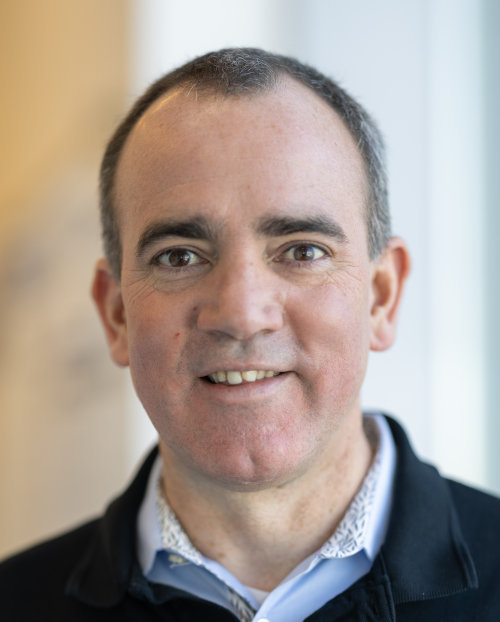
Prof Rein Ulijn PhD Msc FRSC FRSE
Rein Ulijn's research group is developing bio-inspired nanotechnology. The fundamental research question that drives his work is how the molecular building blocks and processes of life can be repurposed, combined and simplified to produce functional materials with designed properties and functions that cannot be achieved using existing design approaches. The resulting materials can be produced from sustainable sources and are finding wide-ranging applications ranging from energy harvesting, to sustainable plastics, personal care, sensing, biomedicine. He is founding Director of the Nanoscience Initiative at the Advanced Science Research Center (ASRC) at CUNY, New York. Prof. Ulijn has held several personal fellowships and has won a number of awards, including the Vannevar Bush Faculty Fellowship, RSC Norman Heatley Medal, Royal Society Merit Award, and was elected as a Fellow of the Royal Society of Edinburgh. He is also the Einstein Professor of Chemistry at Hunter College of CUNY.
Present appointments:
2022-present: Director of the NSF Research Training Grant (NRT) Nanoscience Connected to Life, Graduate Center, City University of New York (CUNY).
2019-present: Director of the ASRC Sensor CAT (Center for Advanced Technology), Advanced Science Research Center, City University of New York (CUNY).
2014-present: Director of the Nanoscience Initiative, Advanced Science Research Center, CUNY.
2014-present: Albert Einstein Professor of Chemistry, Hunter College, CUNY.
Previous employment:
2008-2017: Professor of Chemistry, Department of Chemistry, WestCHEM, University of Strathclyde, UK.
2012-2014: Vice Dean Research (Science), University of Strathclyde.
2006-2008: Associate Professor and EPSRC Advanced Research Fellow, School of Materials & Interdisciplinary Biocentre (MIB), University of Manchester, UK.
2003- 2006: Assistant Professor in Biomedical Materials, School of Materials, UMIST/University of Manchester.
2001-2003: Postdoctoral research associate, School of Chemistry, University of Edinburgh, UK. Advisor: Prof. Sabine Flitsch.
Education:
1998- 2001: PhD Physical Chemistry, University of Strathclyde, UK. Advisor: Prof. Peter J. Halling and Dr. Barry D. Moore.
1993-1998: MSc Biotechnology, University of Wageningen, NL.
Memberships:
American Academy for the Advancement of Science (AAAS)
American Chemical Society (ACS)
Materials Research Society (MRS)
Royal Society of Chemistry (RSC) (Fellow since 2008)
Royal Society of Edinburgh (RSE) (Fellow since 2014)
Fellowships and Awards:
2021: Vannevar Bush Faculty Fellowship
2020: World Science University Faculty
2020: Batsheva de Rothschild Fellowship
2014: Fellowship of the Royal Society of Edinburgh (FRSE)
2014: Royal Society Wolfson Merit Award
2014: RSC Emerging Technologies Award
2013: RSC Norman Heatley Prize
2010: ERC Consolidator Grant
2009: NW Biomedical Awards for Innovation
2008: Fellow of the Royal Society of Chemistry (FRSC)
2007: Macro Group UK Young Researchers Medal
2007: Leverhulme Trust Leadership Award
2006: EPSRC Advanced Research Fellowship
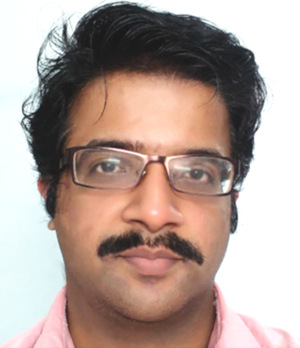
Dr Vignesh Athiyarath
Vignesh obtained B.Sc. degree in Chemistry from S.N.G.S. College Pattambi, (Kerala, India). He joined as a first Integrated MS-PhD student at IISER Thiruvananthapuram, in School of Chemistry. He completed PhD in 2020, working with Prof. Kana M. Sureshan. During PhD he worked on the synthesis of peptido- and carbohydrate-mimetics. He used topochemical polymerization strategy for the synthesis of peptidomimetics, and conventional multi-step synthetic organic chemistry approach for the synthesis of carbohydrate-mimics. He also elucidated properties of these synthesized novel biomimetics in a material-chemistry and biological point of view. In 2021, he joined ASRC, CUNY (New York, USA) as a joined postdoctoral research associate with Prof. Rein Ulijn and Prof. Xi Chen. His work is focussed on development of chemo-mechanical peptide actuators by induced fit concept.
Email
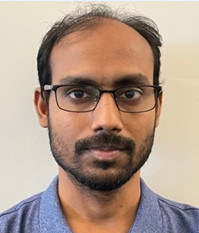
Dr Avishek Dey
Avishek obtained his B.Sc. and M.Sc. from the Midnapore College and Vidyasagar University, India. He received his Ph.D. in 2018 from Department of Chemistry, Indian Institute of Technology Kharagpur, India, under the guidance of Prof. Kumar Biradha. His research focused on the self-assembled functional materials using supramolecular approach. Subsequently, he joined Prof. Niveen Khashab group at King Abdullah University of Science and Technology (KAUST), Saudi Arabia as a Postdoctoral Fellow in the same year where his research focused on self-assembly of organic materials such as cages, macrocycles, energy intensive separations and bioimaging. He has been also awarded JSPS fellowship, Japan in 2022. Then, he joined as a Postdoctoral Research Associate in the Prof. Eric Bloch group at University of Delaware, USA to investigate the self-assembly of the porous cages. Avishek joined Prof. Rein Ulijn's group at Advance Science Research Center, CUNY (New York, USA) in 2023 as a Research Associate to work on the functional organic materials such as systems and flow chemistry, adaptive peptide assembly using machine learning techniques. Email
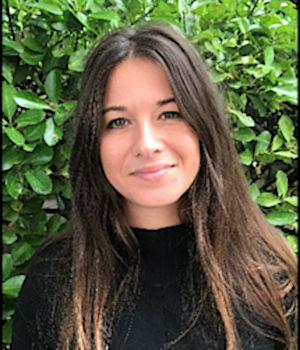
Dr Maeva Coste
Maeva obtained a BSc and MSc in organic chemistry and chemistry of biomolecules at the University of Montpellier, France. Then, she pursued and received her Ph.D. in Chemistry, Biomolecular Engineering from the University of Montpellier. Her Ph.D. was conducted under the supervision of Dr. Sebastien Ulrich in the Institut des Biomolecules Max Mousseron (IBMM). Her thesis projects were focused on the design, synthesis and characterization of programmed and DNA-templated self-assemblies aromatic-peptide conjugates. She joined Prof. Rein Ulijn's group in 2022 as a Postdoctoral Research Associate to investigate peptide self-assemblies and their properties. Email

Dr Hema Kuntrapakam
Hema obtained a BSc and MSc in Organic Chemistry from Sri Venkateswara University, Tirupati (Andhra Pradesh, India). She pursued her PhD in Chemistry under the guidance of Prof. Kana M. Sureshan at IISER Thiruvananthapuram (Kerala, India). Her thesis is focused on the "Synthesis of Various Biopolymer Mimics via Topochemical Azide-Alkyne Cycloaddition," and she received her doctorate degree in 2019. After completing her PhD, Hema moved to Israel in 2020 to work as a postdoc with Prof. Rafal Klajn at the Weizmann Institute of Science. During her time there, she worked on "Stimuli-Responsive Transformations in the Cage-Guest Inclusion Complexes." Hema joined the Advanced Science Research Center at CUNY (New York, USA) in 2023 as a postdoc. She works in the group of Prof. Rein Ulijn, where she is involved in the synthesis of metal-peptide complexes, which have potential applications in chiral molecular recognition. When she is not in the lab, Hema loves to travel and explore different cultures. She also enjoys reading books on psychology, personality development, and fiction, and listening to music. Additionally, she likes to communicate science to non-science audiences. Email

Dr Hamish Swanson
Hamish obtained an MChem degree in Pure and Applied Chemistry at The University of Strathclyde. During this time, he undertook a research placement at the Indian Institute of Technology (IIT) Guwahati. In 2020 he stayed on at Strathclyde to pursue a PhD scholarship funded by the Carnegie Trust for the Universities of Scotland under the co-supervision of Prof. Tell Tuttle and Dr Aaron Lau. His research focused on the study self-assembling peptoid and modified peptide materials using a combined theoretical and laboratory-based approach. A significant outcome of this work was Martinoid, a Martini forcefield for peptoid simulations. In 2024, he joined Prof. Rein Ulijn’s laboratory as a postdoctoral research associate where he will focus on the development of frameworks to rationalize peptide sequence property relationships. Email

Dr Aritra Sarkar
Aritra Sarkar is a Postdoctoral Fellow in the group. He obtained his Master’s degree in Chemical Science from the Indian Institute of Technology (IIT) Guwahati in 2015, followed by a Ph.D. in November 2020 at JNCASR, Bangalore, under the supervision of Prof. Subi George. His doctoral research focused on developing design strategies for controlled multicomponent supramolecular polymerization and investigating the underlying mechanisms of supramolecular polymerization. In February 2021, Aritra joined the University of Mainz as a Postdoctoral Fellow in the group of Prof. Andreas Walther, where he worked on redox-based chemical reaction networks aimed at creating autonomous and adaptive material systems. In July 2025, he moved to the USA to join the group of Prof. Rein Ulijn, where he is expanding his expertise in systems chemistry. His current research centers on dynamic peptide libraries and their potential to encode and implement memory functions. Email

Kenny Barriales
Kenny graduated Hunter College with a Bachelors degree in Chemistry. Kenny joined the Ulijn Lab as a PhD student and his research focuses on the use of melanin like peptide materials. Before obtaining a research position, Kenny has done volunteer work at Pfizer where he learned greater in-depth detail of advancements in chemical technology. Apart from research, Kenny likes to spend his time playing sports and going to the gym. Email

Atena Farahpour
Atena completed her B.Sc. in Applied Chemistry and an M.Sc. in Polymer Chemistry, both from Ferdowsi University in Iran. Her focus during her M.Sc. research was on Gene Delivery. She began her Ph.D. in Chemistry at CUNY Graduate Center in 2022 and initiated her research at ASRC (Advanced Science Research Center) and MSK (Memorial Sloan Kettering) in 2023, under the guidance of Professors Rein Ulijn and Daniel Heller. Her current research emphasizes RNA and Drug Delivery using peptides. Email
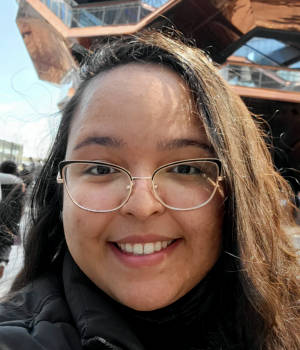
Paola Colon
Paola graduated with a B.S in Industrial Chemistry from the University of Puerto Rico in Humacao. She worked with understanding the ligand interactions and molecular modeling of 1-benzazepine analogues to find out which ones better fit into the binding site of the nicotinic acetylcholinesterase receptor (nAChR) of the 2PH9 protein using computational chemistry. She joined the Ph.D. program in Chemistry at the CUNY Graduate Center in 2021. Then Paola decided to join Ulijn Lab in 2022 at the Advanced Science Research Center (ASRC). Her research interests include peptide self-assembly, nanotechnology, peptide synthesis, surfactant capacity. In addition to doing research Paola enjoys listening to music, traveling and reading. Email

Anna Geissmann
Anna was born in Paris, France and moved to the US in 2017. Anna joined the Ulijn Lab in 2020 as part of her undergraduate research, where she worked on self-assembling peptides and subsequently joined the group as a PhD candidate. Email
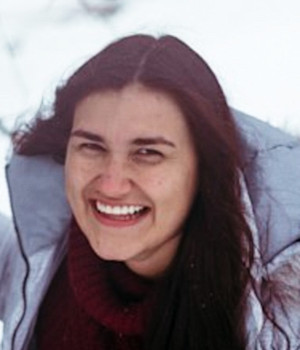
Elma Naranjo Estepa
Elma obtained her B.S. and MSc. in chemical engineering from Universidad Nacional of Colombia. Her master's thesis was conducted under the supervision of Professor Jairo Perilla. In 2021 she joined CCNY's Ph.D. program. She is currently working on the pre-organization and induced fit in chemo-mechanical peptide materials under the supervision of Professor Xi Chen and Professor Rein Ulijn at the ASRC. Besides research, Elma enjoys hiking, traveling, and playing basketball. Email
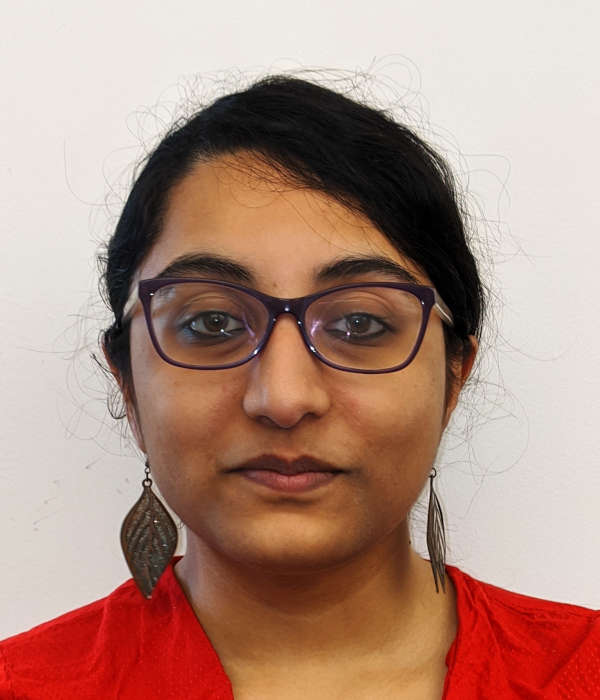
Maithreyi Ramakrishnan
Maithreyi graduated with a Masters degree from Centre for Excellence in Basic Sciences, Mumbai, India. Over the course of her degree, she was selected to work on a funded project for her Masters dissertation under Prof. David Smith at the University of York, UK, on two component supramolecular gels. She has also worked on the effect of curcumin in modifying the pathway of HEWL aggregation. In her undergraduate years, she was selected for National Initiative on Undergraduate Science, which provides undergraduate students with research opportunities. During this, she worked on synthesizing nanomaterials which have potential applications in effluent purification. Her research interests include enzyme responsive materials, and self-assembly. Email
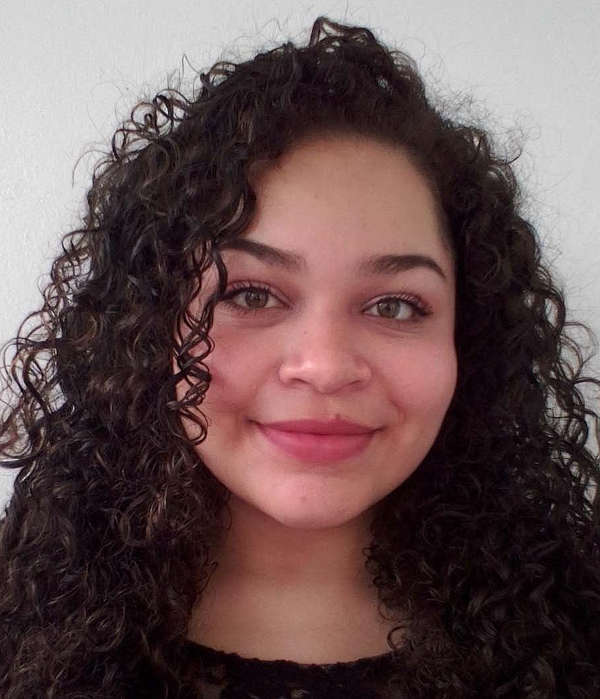
Janel Rivera Cancel
Janel obtained her double major B.S. in chemistry and biomedical sciences from the Pontifical Catholic University of Puerto Rico in Ponce. Here she conducted research on the synthesis and characterization of quantum dots for toxic waste treatment. She joined the Chemistry Ph.D. program in 2020 and is currently co-advised by Professor Nicolas Giovambattista, Professor Gustavo Lopez, and Professor Xi Chen. She now does research with supramolecular water responsive materials and isotope effects on their mechanical properties. Email

Crisol Aguirre Ortiz
Crisol received her bachelor’s degree in chemistry with a biochemistry concentration from California State University, San Bernardino in 2023. During her time there she did volunteer work on an environmentally friendly synthesis and quality check project with a startup company. She also became a research student for the Center for Advanced Functional Materials, her project was focused on a computational analysis of piezoelectric crystals. This was all under the guidance of Dr. Kimberley Cousins. After graduating, Crisol came to CUNY Graduate Center in 2023 where she began her PhD in Biochemistry. She joined Dr. Rein Ulijn’s group in 2024 and her research focuses on neutral peptide based anion receptors. For fun she loves to go to the beach, concerts, and bike riding. Email

Ameena Yoonus
Ameena obtained her BS-MS degree in Chemistry with a minor in Biology from the Indian Institute of Science Education and Research Thiruvananthapuram (IISER TVM). During her master's research, she worked under the guidance of Prof. Kana M. Sureshan on designing and developing functionalizable, photoresponsive polymers using a Topochemical approach. In 2024, she joined the Chemistry PhD program at the Graduate Center, CUNY, and started her research in Prof. Rein Ulijn's lab at the ASRC. Her research explores Dynamic Peptide Libraries and Liquid-Liquid Phase Separation (LLPS), focusing on how peptide sequence and molecular interactions govern assembly pathways, phase behaviour, and drive the emergence of complex assemblies. She is particularly interested in understanding the transmission of chemical information in adaptive peptide systems, in the context of the origins of life. Email

Yuntao Qiu
Yuntao obtained his B.Sc. in Chemistry from Jilin University and his M.Sc. in Chemistry from New York University. He is currently a Ph.D. student in Biochemistry at the CUNY Graduate Center, completing a research rotation in the Ulijn Lab at the ASRC. His work focuses on designing peptide-based systems to differentiate between structurally similar metabolites, specifically glucose-1-phosphate (G1P) and glucose-6-phosphate (G6P), with the broader aim of developing selective molecular recognition strategies. Email

Wasiq Mahmood
Wasiq received his Bachelor’s Degree in Chemistry with a concentration in Biochemistry from Hunter College. He joined the lab in 2023, beginning his research by characterizing which dipeptides functionalize graphene under Kenny's mentorship. Now, his work focuses on functionalizing cellulose through mimetic melanization and functionalized graphene. His research aims to enhance material properties for biomedical and industrial applications by leveraging biomimetic strategies to improve functionality and sustainability. Email

Nadia Hossain
Nadia Hossain is a senior at Hunter College, majoring in Biochemistry with a minor in Sociology. She has conducted research in cancer biology, previously working at Weill Cornell Medical College, where she studied prostate cancer metastasis using cross-species analysis. She also participated in a Summer REU at Temple University, investigating CTLA4-mediated regulation of the AKT pathway in melanoma progression. Currently, Nadia is conducting research in Professor Rein Ulijn’s lab under the guidance of Dr. Maeva Coste and Dr. Hamish Swanson, focusing on the influence of ionic media on dipeptide drying morphologies. Alongside her research, she plans to apply to medical school after taking 2 gap years. Her academic interests include nanotechnology, cancer biology, and neuroscience. Outside the lab, she enjoys painting, playing the piano, and reading books. Email

Nataliya Pavlyk
Nataliya graduated from Hunter College this year with a Bachelor’s in Biochemistry and a sociology minor. She is taking a 2.5 gap years before applying to medical school. Currently, she is working on enhancing the stability of vitamins through encapsulation by tryptophan-containing peptides under the guidance of Dr. Maeva Coste and Paola Colon. In her free time, she enjoys reading fantasy and thriller books and inline skating. Email

Max Zeldich
Max is an undergraduate student at the Macaulay Honors College at Hunter College. He previously worked on determining the role that insulin and nutrient-depleted conditions play on bacterial biofilm dispersion at the Binghamton Biofilm Research Center at SUNY Binghamton. As a current undergraduate researcher at the Ulijn lab, he is studying the self-assembly behavior of dipeptides in the presence of other molecules, such as drugs and vitamins. After graduating with his bachelor's degree, he hopes to pursue a graduate education in pharmacology and drug design. Email

Cher Li
Cher is a junior at Hunter College majoring in Chemistry. She previously worked under Professor Alvarado at Queens College studying the reversible molecular mechanisms that shape a genome to changes in the environment. At Ulijn Lab, under the guidance of Dr. Hamish Swanson, her current research focuses on using molecular dynamics simulations to mechanistically study the self-assembly behavior of short-chain peptides, in order to characterize the relationship between peptide sequence and behavior. After graduating with her Bachelor’s, she hopes to further pursue research through graduate school or in industry. Email
